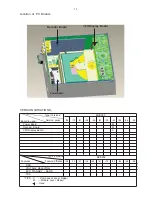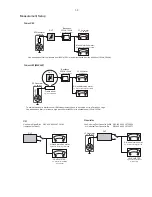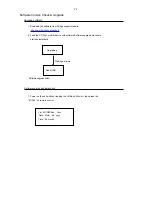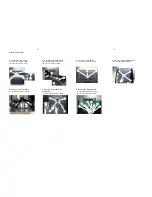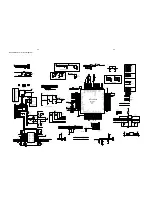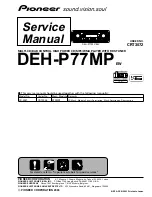
Items of Safety Attention
1-5
Attention:
Please read <Items of Safty Attention> carefully. If
there are unexpected conflicts between safefy attention and
maintenance attention, please abide to safety attention: Safety
first.
Common Maintenance Attention
Before operating, please unplug the AC power cord from the
outlet.
a) Disassemble any parts.
b) Cut-off or re-connect plug and other inserting parts.
c) When electrolysis capacitance and test parts is parallel
connected, anti-polarity and wrong replace will cause
explosion.
Do not spray chemical on the component system, surroundings
and any parts.
Clean the electric junction with a cotton stick which is with
cleaning mixture, except there is other demand in this manual.
Please notes:
It is a kind of inflammable mixture.
Do not use lubricant to the soldering point, except there is
other demand in this manual
Common Controlling
During maintenance, please take common controlling to protect
component system and electronic parts and prevent damages
to the circuit due to improper operation.
Led out wire should be kept away from high-pressure or
high-temperature parts.
ES
Some semi-conductor parts are easily damaged by static
charges, these parts are called: ES. They are mainly the cores
of transistor lead identification. The following technical ways
can be used to reduce the damages by static charges.
Before connecting semi-conductor or the parts. Let off the
static charges of the body by connection the earth. In the other
hand, to prevent potential electric shock hazard, please use
industrial static handle before connecting power for checking
the equipment.
After unsoldering the ES parts, put the parts on a electric
surface such as aluminum foil to prevent accumulating static
charges to damage the parts.
Only use anti-static charges grounded soldering irons to
unsolder the parts or solder ES parts.
Some soldering tin called “Anti-static charges” can also
generate charges to damage ES parts.
Do not use poisonous and caustic agent which these kinds of
chemicals can generate static charges to damage the ES
parts.
Do not take ES parts out of conductive packages until they are
used (mostly replacing ES parts is packed with aluminum foil or
similar conductive materials making a short circuit).
After taking replaceable ES parts from Anti-static charges
cone, please insert the ES parts in the correctly location soon
as possible.
During handing sealed ES parts, reduce the movement of the
body (clothes rubbing and moving on the rug can generate
static charge to damage the ES parts.)
Maintenance Attention
Common Soldering Rules
Use only grounded low-voltage soldering iron, and proper size and
shape which can sustain the temperature of soldering horn to
range from 350 to 390.
Use rosin flux which is demanded by RMA ; include 60%Tin 40%
lead.
To maintain soldering iron and its tin very well.
Use the wire brush but not spray cleaners such as Freon to clean
the soldering surface.
Adopt the melting ways:
a) The temperature of soldering horn range from 350 to 390.
b) Heat up the parts pin, until soldering tin is molten.
c) Use the desoldering pump to suck out the molten soldering tin
quickly.
Note:
Quickly operating can prevent superheating the
electronic-plating copper.
Adopt the following soldering ways.
a) The temperature of soldering horn range from 350 to 390.
b) Hold the soldering iron and welding rod pointed to the parts pin,
until soldering tin is molten. Then move the soldering horn
quickly to the location that you want to solder.
Note:
Quickly operating can prevent superheating
electronic-plating copper of printed circuit board.
c) Check the welting zone carefully, then brush the unwanted
soldering tin away with a wire brush.
Unsolder/Replace IC
Notes:
Do not touch the IC body directly with soldering iron.
Pre-heating soldering iron at about 130 for some seconds avoid
the damages caused by IC heated suddenly.
For normal IC, the temperature of the solder horn is about 350,
and can increase to 390 for some bigger IC.
Use the filamentous welding rod and solder which thickness is
about 0.3mm to solder thin IC and add the solder as needed.
Replace the IC carefully and solder it quickly.
After unsoldering the IC, clean the basic board carefully to ensure
the board is usable.
Prevent the molten soldering tin dripping on the board which will
engender a short circuit.
Aim at the first terminal and fix it, then aim at other terminals for
correctly inserting IC. You can solder quickly just like this.
Before operating, please make sure the IC is unusable. Do not
unsolder repeatedly.
During soldering especially soldering a thin IC with many pins,
check the weld carefully.
After replacing, check that there is not soldering leak, rosin joint,
short circuit and so on.
Unsolder:
Use the soldering iron to melt the soldering tin.
Before unsoldering IC, suck out the molten solder tin.
Replace
˖
Make sure all the IC pins are on their correct location, then solder.
Use a wire brush to clean the welting zone.


